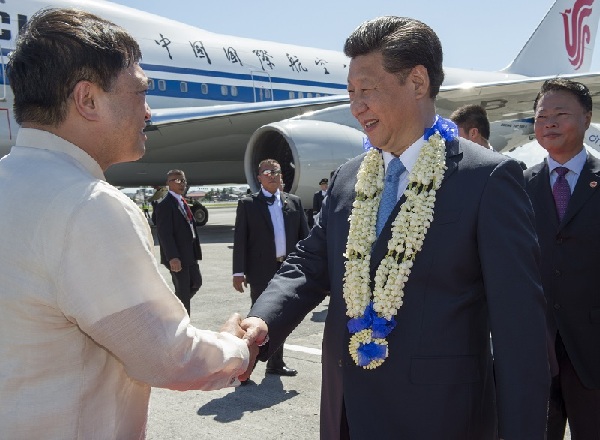APEC platform for economic talks
By Zhu Feng (China Daily) Updated: 2015-11-19 07:56
|
 |
|
Chinese President Xi Jinping arrives in Manila, the Philippines, on November 17, 2015, for the 33rd Asia-Pacific Economic Cooperation (APEC) Economic Leaders' Meeting. [Photo/people.cn] |
The ongoing Asia-Pacific Economic Cooperation economic leaders' meeting in Manila has brought together leaders of APEC economies, including Chinese President Xi Jinping, to discuss the strategic plans for future collaboration.
With the world economy still struggling and economic cooperation in the Asia-Pacific region being on the verge of a breakdown, the two-day event has all the more reason to accord priority to regional and global economic integration. It should also encourage all APEC leaders to candidly exchange their proposals and ideas for inclusive global growth, as the theme "Building Inclusive Economies, Building a Better World" indicates.
However, in the run-up to this year's APEC meeting, the United States has been acting otherwise. Washington, in tandem with some US media outlets, has been pressuring the meeting organizers to put the South China Sea disputes in a spotlight, disregarding Manila's repeated promises to exclude them from the meeting. On Wednesday, US President Barack Obama called on China to halt further land reclamation and new construction in the disputed waters. At a meeting with Philippine President Benigno Aquino III, Obama called for "bold steps" to lower tensions in the region.
Addressing the APEC CEO summit on Wednesday, Xi urged APEC members to spare no efforts in fostering a peaceful environment conducive to development. He said, Asia-Pacific nations should respect each other's development paths, chosen in line with their respective conditions, and resolve any differences through dialogue and consultation. It would be a pity if the US ends up heightening regional tensions within the largest economic bloc in the Asia-Pacific, which plays an indispensable role in promoting free and convenient trade and investment.

I’ve lived in China for quite a considerable time including my graduate school years, travelled and worked in a few cities and still choose my destination taking into consideration the density of smog or PM2.5 particulate matter in the region.











